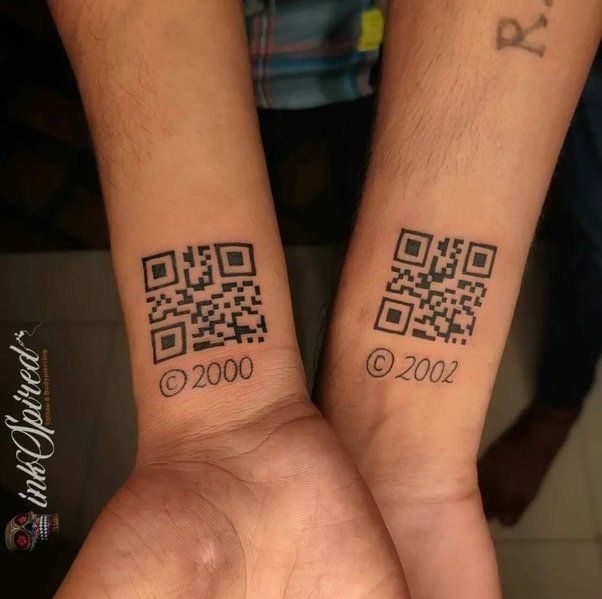Will a QR Code Tattoo Work?
The short answer is YES. QR Code tattoo works.
But you need to be careful about the qr sizes.
In the digital age where technology is constantly evolving, the QR code tattoo integrates the utility of quick response (QR) codes with the artistry of tattooing.
It creates a unique blend of technology and personal expression, transforming body art into a dynamic portal.
QR code tattoos can hide text, contact information, or URLs that lead to various digital content.

Origin of the Idea
- Rooted in modern pop culture and the trend of biohacking.
- Inspired by interactive tattoos seen in movies like "Eastern Promises" and real-life instances like K.A.R.L's live exhibit.
- Examples include a Canadian man's QR code tattoo leading to an animated version of 'Nyan Cat'.
QR Code Tattoo’s Functionality: Assessment if technology can read the QR code tattoos
Assessment of Technology
- QR codes work by being scanned by a reader, interpreting reflected light into data.
- Success depends on tattoo precision and code clarity.
Factors Influencing QR Code Tattoo Efficiency
- Tattoo position, skin integrity, ink fading, and skin sagging affect readability.
- Tattoo Position: Flat areas of the body are better for readability.
- Skin Integrity: Scars and skin texture variations can disrupt the QR code.
- Ink Fading: Over time, tattoos fade, affecting code sharpness.
- Skin Sagging: Age-related skin changes can alter tattoo proportions.
Permanency and Practicality of QR Code Tattoos
Permanency of Tattoos
- QR codes in digital format allow for easy updates.
- However, a tattoo is permanent and cannot be changed as the linked data evolves.
- If a QR code tattoo points to a specific URL that changes, the tattoo would no longer be accurate.
Considerations
- Permanency is a critical aspect to consider when getting a QR code tattoo.
- QR code tattoos are best suited for information that does not change over time.
Conclusion
- While QR code tattoos can theoretically be read by technology, practicality depends on various factors:
- Skin characteristics
- Tattoo quality
- Permanency of data
- These factors should be carefully considered before getting a QR code tattoo.
Potential Use Cases of QR Code Tattoos
Medical Use: Emergency Health Information
- QR code tattoos can store vital health information.
- In emergencies, scanning the tattoo provides details like allergies, medical conditions, and emergency contacts.
- This quick access to information can greatly aid medical professionals in urgent situations.
Identification: Personal Data and Contact Information
- QR codes on tattoos can hold identification details.
- For instance, in remote areas, a hiker's QR code tattoo could provide identity and emergency contact information.
- It's also useful for global travelers, storing travel documents, contacts, and addresses for streamlined verification.
Artistic Expression: Linking Tattoos to Digital Artwork
- QR code tattoos offer a new dimension to artistic expression.
- Artists can link the tattoo to digital artwork, merging physical and digital mediums.
- This innovative approach connects individuals to the digital world, enhancing self-expression.
Marketing Potential: Brand Promotion and Loyalty Programs
- Businesses can utilize QR code tattoos for brand promotion.
- Brand ambassadors can sport QR tattoos linking to websites, product launches, or promotional videos.
- Loyalty schemes can offer unique QR code tattoos to customers, providing discounts or rewards upon scanning.
Conclusion: Potential and Future
- While the longevity and practicality of QR code tattoos are debated, their potential uses are diverse.
- With ongoing research and improvements in readability, they could become more mainstream across various sectors.
Ethical and Health Implications About QR Tattoos
Health Risks
Getting a tattoo, whether it's a QR code or not, carries medical risks.
Risks include infection, allergic reactions, granulomas, and keloid formations.
To minimize risks, it's crucial to have QR code tattoos done by a certified professional under hygienic conditions.
Privacy Issues and Abuse
QR code tattoos may contain personal information, raising privacy concerns.
Visible encoding of personal data can expose individuals to risks, especially if the data is sensitive.
Misuse is also a concern, particularly if the QR code links to sensitive or private digital content.
Ethical Considerations
The integration of digital technology with our bodies sparks ethical discussions.
Questions arise about the ethical implications of encoding personal or health data visibly.
It's essential to consider at what point technological enhancement might invade personal privacy or depersonalize identity.
These discussions are vital as QR code tattoos and similar technologies become more prevalent.
The Future of QR Code Tattoos
Current Developments
Current applications for QR code tattoos remain relatively niche, largely confined to artistry and individual expression. However, tech enthusiasts and creative industries continue to push boundaries, hinting at broader future applications.
Prospective Future Applications and Trends
Considering societal trends towards digitization and wearable technology, it's feasible that QR code tattoos could become more prevalent. Future applications could span across numerous sectors, including data security, digital health records, location tracking, or even voting.
In conclusion, the intersection of technology and human bodies in the form of QR code tattoos is a concept both fascinating and challenging. Although feasible from a technological perspective, the success and effectiveness of such tattoos are influenced by several factors including skin's nature and degradation over time.
The potential applications are varied and potentially transformative, from emergency health support to artistic expression. However, these opportunities do not come without risks, particularly about privacy and ethics. As society navigates these novel developments, it's crucial to keep dialogs open about the benefits, challenges, and implications these technologies bring.

